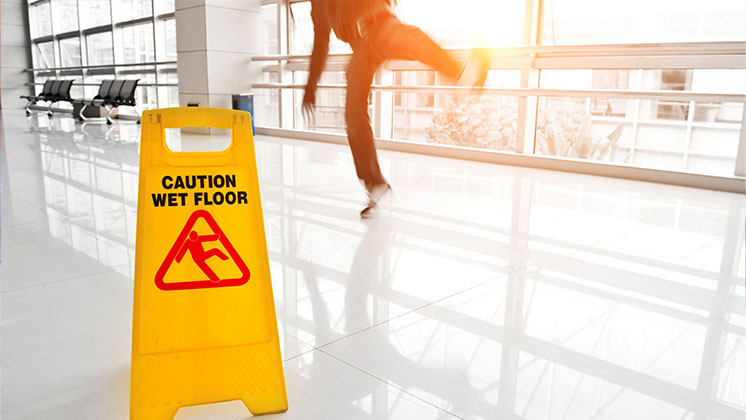Slip and Fall Accident Injuries at Work and Workers’ Compensation in Virginia

When workplace accidents occur, slip and fall incidents rank among the most common causes of injury. Understanding your rights and responsibilities under Virginia workers’ compensation law is crucial for protecting your interests and ensuring proper compensation for workplace injuries.
Understanding Workplace Slip and Fall Accidents
Slip and fall accidents in the workplace can occur due to various hazardous conditions. Common causes include wet or waxed floors, uneven surfaces, torn carpets, poor lighting, and cluttered walkways. These accidents can result in serious injuries including fractures, broken bones, and head trauma that may require extensive medical treatment and time away from work.
Virginia Workers’ Compensation Coverage
Workers’ compensation in Virginia provides no-fault insurance coverage for employees’ work-related injuries and illnesses. Most Virginia employers with three or more workers are required to carry workers’ compensation insurance. This coverage typically includes:
- Medical expenses
- Two-thirds of lost income
- Long-term disability benefits
- Vocational re-training when necessary.
Reporting Requirements and Deadlines
When a slip and fall accident occurs at work, specific reporting requirements must be followed:
- Initial reporting: Report your injury to your employer immediately and no later than 30 days from the accident date.
- Employer’s responsibility: Your employer must file a First Report of Injury (FROI) with the Virginia Workers’ Compensation Commission within 10 days of receiving your notice.
- Claim filing: You must file a claim with the Commission within two years of the accident.
Establishing Compensability
For a slip-and-fall injury to be compensable under Virginia workers’ compensation, it must meet specific criteria:
- Work-related activity: The injury must occur while performing job duties or during work-related activities.
- Direct relationship: There must be a clear connection between the work activity and the injury.
- Specific time and place: The accident must happen at a specific time and place, not gradually over time. A few injuries, such as carpal tunnel syndrome, may be an exception to this if you can prove they’re directly work-related.
Special Circumstances
Certain situations may still qualify for workers’ compensation coverage:
- Company functions: Injuries sustained during company-sponsored events may be covered.
- Business travel: Injuries occurring during business travel or while operating company vehicles typically qualify for coverage.
- Lunch breaks: While most lunch break injuries are not covered, exceptions exist if the injury occurs while performing work-related tasks.
Steps to Take After a Workplace Slip and Fall
- Seek immediate medical attention.
- Document the accident scene and conditions.
- Report the injury to your supervisor.
- File a claim with the Virginia Workers’ Compensation Commission.
- Keep detailed records of all medical treatment.
- Follow prescribed medical treatment plans.
Frequently Asked Questions (FAQs)
Q: What should I do immediately after a slip and fall accident at work?
A: After a workplace slip and fall, your first priority should be your health and safety. Seek immediate medical attention if needed, ensuring you inform healthcare providers that this is a work-related injury. Document the accident scene by taking photos if possible, and report the incident to your supervisor immediately.
Within 30 days, you must formally report the injury to your employer, though it’s best to do this as soon as possible. Keep detailed records of all medical treatment and follow your doctor’s instructions carefully. Additionally, maintain a daily journal documenting your recovery process and any limitations you experience.
Q: How long do I have to file a workers’ compensation claim in Virginia?
A: In Virginia, you have two years from the date of the accident to file a workers’ compensation claim with the Virginia Workers’ Compensation Commission. However, you must report the injury to your employer within 30 days of the accident. Failing to meet these deadlines could result in the denial of your claim.
It’s important to note that filing a report with your employer is not the same as filing a claim with the Commission. Both steps are necessary to protect your rights.
Q: What benefits am I entitled to under Virginia workers’ compensation for a slip and fall injury?
A: Under Virginia workers’ compensation, you may be entitled to several types of benefits following a slip and fall injury. These include coverage for all reasonable and necessary medical expenses related to your injury, wage replacement benefits equal to two-thirds of your average weekly wage, and vocational rehabilitation services if needed.
If your injury results in permanent disability, you may also be eligible for long-term disability benefits. The specific benefits you receive will depend on the severity of your injury and its impact on your ability to work.
Q: Can I choose my own doctor for treatment of my workplace slip and fall injury?
A: In Virginia, you’ll typically choose your treating physician from a panel of three doctors provided by your employer or their insurance carrier. If you seek treatment from your own doctor without authorization, your medical expenses may not be covered. However, in emergency situations, you can seek immediate medical attention from any available healthcare provider.
Q: What if my employer doesn’t have workers’ compensation insurance?
A: If your employer doesn’t have workers’ compensation insurance, you still have options for pursuing compensation. One is to file a claim with the Virginia Workers’ Compensation Commission under their Uninsured Employer’s Fund. If successful, you can receive the same benefits you would have received if your employer had work comp insurance. The Employer’s Fund may then be reimbursed by your employer.
If your workplace slip-and-fall was due to your employer’s negligence, another option to get compensated is to file a personal injury lawsuit. Examples of workplace negligence are poorly maintained equipment, lack of necessary safety features, inadequate lighting, and dangerous infrastructure.
Additionally, there may be “statutory employers” who could be liable for your work injury. For example, if you work for an uninsured subcontractor, the general contractor’s workers’ compensation insurance may cover your injury.
To determine which option could be your best pathway to compensation, please consult a trusted workers’ compensation attorney.
Consult for Free With a Reliable Workers’ Comp Lawyer in Virginia
For over 25 years now, Virginians have trusted Attorney Jaleh K. Slominski for their workers’ compensation claims. Attorney Slominski is proficient in slip-and-fall cases, and is ready to provide the sharp legal guidance and advocacy you need.
For assistance with your workplace slip and fall claim, contact Slominski Law at (434) 384-9400 (Lynchburg office) or (540) 554-3762 (Roanoke office).





